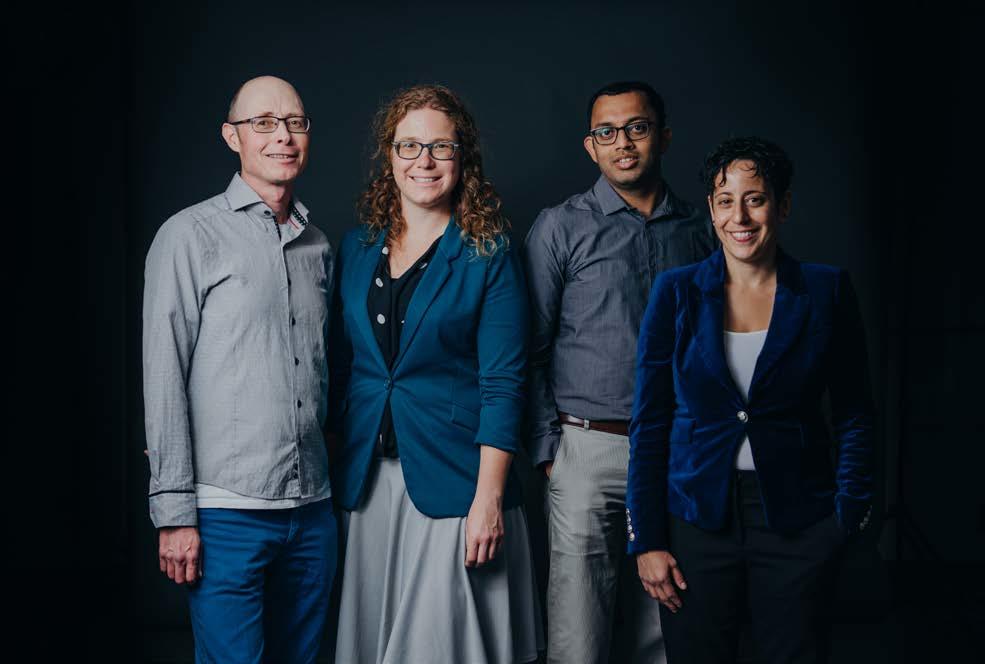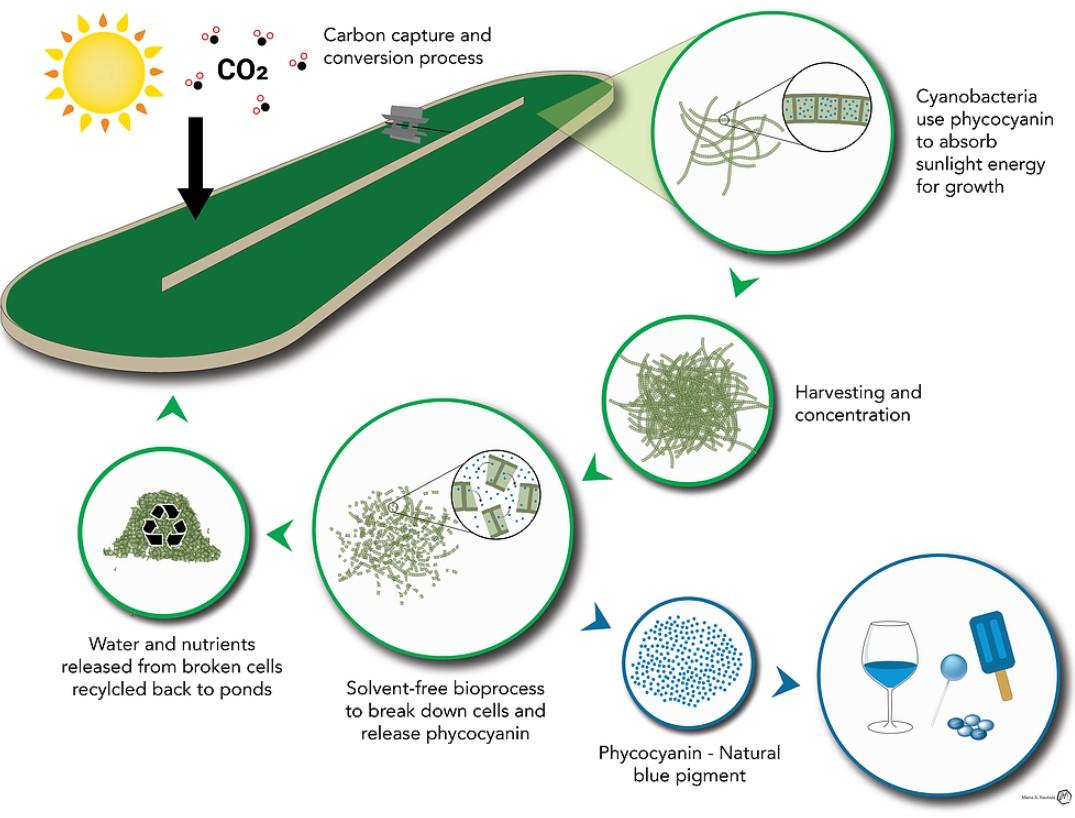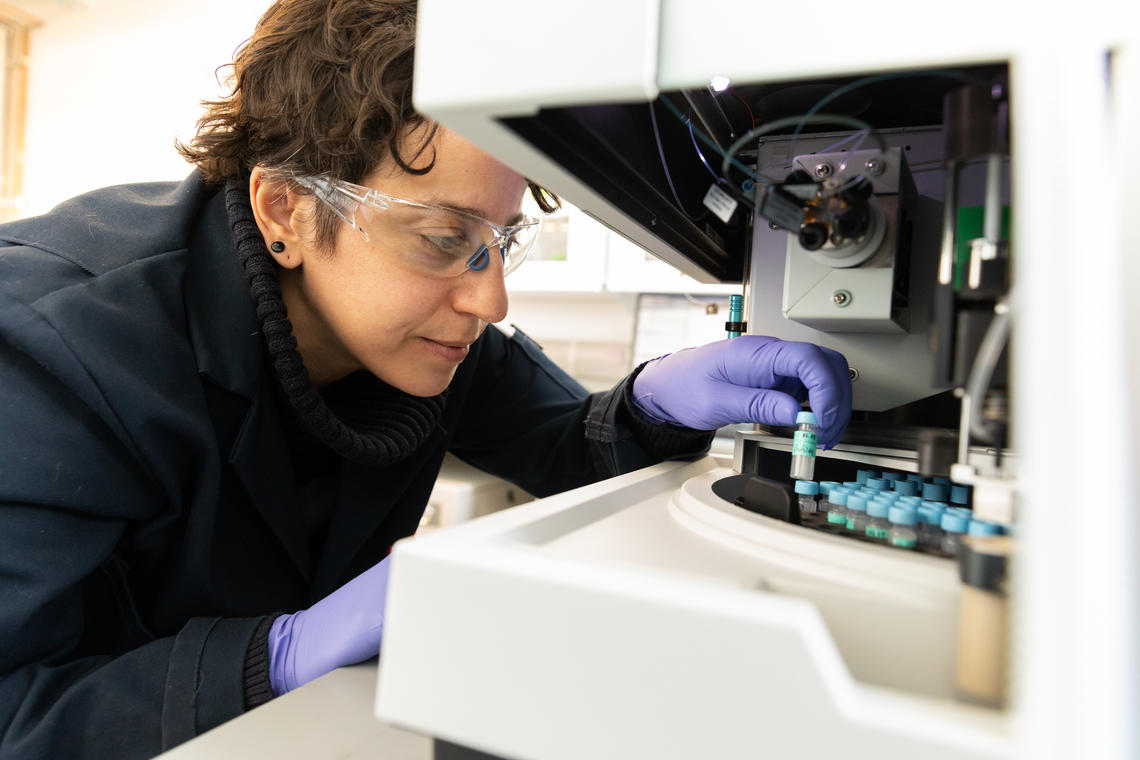
May 18, 2021
Grounded in UCalgary research, visionary startup aims for global blue dye market
Agasteswar Vadlamani stared with growing excitement at the high concentration of deep-blue liquid floating above the green microbial goo.
Since 2013, UCalgary students and researchers like Vadlamani had been lured by the potential of discovering renewable forms of bioenergy hidden in the complex biological processes unique to Soda Lakes in the Cariboo Plateau of British Columbia, and a handful of similar lakes scattered around the planet. These lakes are among the most biologically productive ecosystems on Earth, due to their highly alkaline waters that draw carbon dioxide from the atmosphere.
But this was something different. Vadlamani, a bioengineer and postdoctoral associate in the Faculty of Science at the University of Calgary, quickly texted pictures to Marc Strous, a principal investigator with the Energy Bioengineering and Geomicrobiology Group and the Global Research Initiative at UCalgary.

Synergia Biotech's bioprocess releases phycocyanin, a viable natural source of blue dye for industry.
Vadlamani and Strous shared their blue discovery with biologist Angela Kouris and environmental microbiologist Christine Sharp, current and former members of the research team, respectively. They decided to shift the focus of their studies, from finding renewable bioenergy, to producing phycocyanin, a valuable, hard-to-obtain photosynthetic pigment commercially used as one of the only blue dyes available from a natural source. Harvested in large enough quantities, the agricultural product could help satisfy a world hungry for climate-friendly alternatives to synthetic colour additives.
Now the researchers were testing a new technology that revolutionized the extraction of phycocyanin from the Soda Lakes algae. Based on the results he was witnessing in the lab, Vadlamani strongly believed their project could scale up and profitably manufacture the blue protein pigment for industry. The innovative technology worked.
Visionary science meets entrepreneurial thinking
The project today has grown into Synergia Biotech, a clean-tech startup with roots in the remarkable transdisciplinary research taking place at the intersection of geoscience, engineering and microbiology at UCalgary. The four scientists are its co-founders. And the fledgling company’s business plans draw heavily from a pillar of UCalgary's Innovation Ecosystem, the Creative Destruction Lab – Rockies (CDL-Rockies), which helps researchers who have developed novel technology to transition out of the lab to scale technology-based companies through objectives-setting mentorship.
The punch line: Not only is Synergia’s technology all-natural. The sunlight-absorbing process actually removes CO2 from the atmosphere. “For each ton of phycocyanin that we produce, we mitigate 10 tons of CO2 emissions,” says Kouris, who is now Synergia’s CEO. “It’s not going to be enough to simply reduce CO2 emissions to save the planet in the future. We’re going to actually have to remove it and use it.”

Synergia Biotech founders, from left: Marc Strous, Christine Sharp, Agasteswar Vadlamani and Angela Kouris.
UCalgary has worked diligently behind the scenes to create a robust network of support for leading researchers who become budding entrepreneurs and innovators. “The idea is that we shift our focus from traditional lab-based discovery to better support those also taking these discoveries through to practical outcomes with real-word impacts,” says Dr. Stephen Larter, associate vice-president (innovation). “Our institution is full of brilliant minds, and we need to provide them with the time, tools and supportive ecosystem to help in them making greater impact. These practical projects also often result in new discoveries and further insights.”
World waiting for a natural blue dye source
Synergia’s main business focus out of the gate is capturing a share of the global food and beverage market for blue dye. Consistently one of the most popular colours in the food, cosmetics, fashion, and design industries, blue is the most difficult colour to find in nature and usually produced using industrial chemical routes, says Dr. Kouris, PhD. And yet, consumers increasingly worry about the potential health risks associated with synthetically derived colours such as allergenicity, toxicity, carcinogenicity, and possible links to hyperactivity in children. Phycocyanin has emerged as the most viable natural source to replace chemical and synthetic versions in industry.
- Read more about Synergia’s entrepreneurial journey
“What will shock most people is that the blue that you find in jeans is the same blue that’s used in cotton candy or gummies that your kids are eating or that you’re eating,” says Kouris. “So instead of having a chemical version of that, we’re going to have a natural version.”

Maria A. Bautista Chavarriaga
Phycocyanin harvested for multiple purposes
What Synergia plans to deliver to the marketplace begins as microbes called cyanobacteria (colloquially called algae), grown and harvested in long, outdoor raceway ponds. Large paddlewheels keep the microbes in circulation. The company’s patent-pending bioprocess passively releases phycocyanin, a pigment with a surprising number of applications. Phycocyanin can be produced in either liquid or powder form, depending on the customer’s requirements. Drawing from scientific research, Synergia points to further benefits, such as an anti-inflammatory, an antioxidant, and an agent in cancer treatment.
At a pilot-scale raceway pond built on campus in 2020, the team successfully replicated the biological processes at the heart of their venture. For more than 100 days, a paddlewheel churned away as research continued. But the four co-founders had more than science on their minds.
Discovery followed by business urgency
In 2019, the team had swung much of its focus to commercializing their discovery. The scientists had applied to CDL-Rockies, to guide the development of their startup. “In early 2019, we were really kind of pushed in the direction of, ‘Hey, you guys have this really cool technology. You need to go on and turn this into a business,” recalls Dr. Sharp, PhD’13, who was involved in Soda Lakes research right at the start. “The business really took a giant leap forward because of all the mentorship in the CDL program.”
A sense of entrepreneurial urgency kicked in as team members and their mentors explored economic models, identified potential customers, and plotted how to enter the marketplace. The team grew to five with the addition of Ben Lightburn, an investor and adviser specializing in early-stage technology companies in the clean-tech and food ingredient industries with extensive experience in product commercialization. The pilot-scale raceway pond at the university gave the fledgling business a basis to test their concept. “We grew enough microbial biomass to extract the phycocyanin using our technology, and then we sent the samples out for customer trials,” explains Dr. Vadlamani, PhD.
The team was one of 25 admitted into CDL’s 2019-20 Prime cohort from an initial pool of 112 applicants. Only eleven graduated, including Synergia. “It isn’t enough for us to encourage our researchers to innovate, turning discoveries to solutions,” says Larter. “We must present them with the support, motivation and mentoring to help launch their inventions into successful ventures. The only part we can’t help them with is having the courage to make the leap, but we know they are prepared for that when they do.”

Biologist Angela Kouris works in a Global Research Initiative lab.
Fritzology Photography
New home on Vancouver Island
Kouris and Vadlamani scoped out potential sites for their scale-up. Their search took them to Vancouver Island, with its sunny conditions and extended shoulder season. “Like anything that’s involved in photosynthesis, we need a lot of sunlight,” Kouris says. “And this is a seasonal business, so how long we can actually grow the microbes and produce our product makes it more viable as a business.” Within a year, Synergia plans to begin construction of the raceway ponds and a small adjoining building to house equipment and processing.
The entrepreneurial journey brought the scientists to a much different landing place than they might have envisioned seven years ago. “I think one thing that's interesting about something like this is that the benefits are almost never where you expect them to be,” says Dr. Strous, PhD. “We started out with a carbon capture and bioenergy project, and ended up with an agricultural business producing food ingredients in a very sustainable way. That’s a take-home message for me.
“I think that's interesting, you put a group of people together and they think they set out on a journey and they ended up somewhere very different.”
- Interested in Synergia Biotech, their all-natural blue pigment, and investment opportunities? Learn more
- As part of UCalgary’s partnership with the Rideau Hall Foundation, we celebrate Canadian Innovation Week. Join UCalgary experts and researchers May 17-21, for a week of conversation, inspiration and ideas. Learn more
About the co-founders of Synergia Biotech
Angela Kouris is a research associate in the Energy Bioengineering Group, and CEO of Synergia Biotech. Kouris is a registered professional biologist and holds a Certificate in Business from the University of Illinois Urbana-Champaign.
Agasteswar Vadlamani is an Innovation Postdoctoral Fellow for 2020-21. These fellowships are awarded to postdoctoral scholars with a track record of innovation activities that translate research results into societal impact. Vadlamani is chief technology officer of Synergia Biotech.
Christine Sharp is an entrepreneur, leader and coach.
Marc Strous was named to the inaugural cohort of Parex Resources Innovation Fellows in 2019. The Parex Resources Innovation Fellowships are awarded to researchers from across the university who are immersed in academic research and community partnerships leading to startups or technology advancement based on new discoveries, insights, and innovation.








